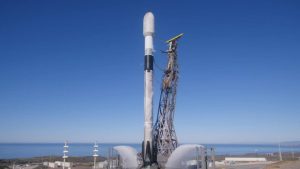FGN-100-d1, Turkiye’s largest satellite, developed indigenously by Fergani Space and manufactured by a private company, successfully entered its orbit after being launched into space.
The FGN-100-d1 satellite, developed indigenously by Fergani Space, founded by Selçuk Bayraktar, Chairman of Baykar and Technology Leader, was launched into space on January 14, 2025, at 22:09 Turkish Time from the Vandenberg Space Force Base in the United States. Thus, the first step of the Positioning Team Satellite Project, conducted by Fergani Space, was successfully completed.
Mission in Space Begins
Weighing 102 kg, FGN-100-d1, Turkiye’s largest satellite produced by a private company, was launched into space under the Rideshare Program as part of the Transporter-12 mission. The indigenous satellite system separated from the launch vehicle approximately 62 minutes after launch and successfully entered its orbit at 23:11 . After settling into orbit, the FGN-100-d1 satellite began its mission successfully by transmitting telemetry data.

“We Have Placed Our First Satellite into Orbit”
The journey of the FGN-100-d1 satellite’s launch and orbital insertion was monitored from the Space Observation and Control Center at the Özdemir Bayraktar National Technology Center by Selçuk Bayraktar, CEO of Fergani Space, and his team. After the satellite began its mission, Bayraktar said, “Our Fergani Space initiative, which we launched in 2022, continues today as a large family of 106 people. Today, we have successfully placed our first satellite into orbit. These satellites will operate as a constellation of team satellites, providing services in both positioning and communication. We carried out this project entirely with our own resources. Our satellite is now in its orbit at 500 kilometers and has completed its first maneuvers.”
“We Will Develop Our Ulugh Beg Global Positioning System With Our Own Resources”
“Hopefully, within 5 years, we will have developed our Ulugh Beg global positioning system with our own resources and share it with all our friendly and brotherly regions. While completing the constellation of our team satellites, we will also continue to work on developing a launch vehicle that weighs 50 tons and can send 1.5 tons into orbit. May it be beneficial and auspicious for our country and nation. I send my congratulations and gratitude to all my companions who have contributed to our country’s space journey by working tirelessly.”
Will Orbit the Earth 15 Times a Day
The FGN-100-d1 satellite, developed entirely with indigenous resources by Fergani engineers, will operate in Low Earth Orbit (LEO) at an altitude of about 510 km and in Sun-Synchronous Orbit (SSO). The indigenous satellite will travel at a speed of 7.6 km/second in orbit, completing approximately 15 orbits of the Earth every day.
Source: DHA


Leave a Comment